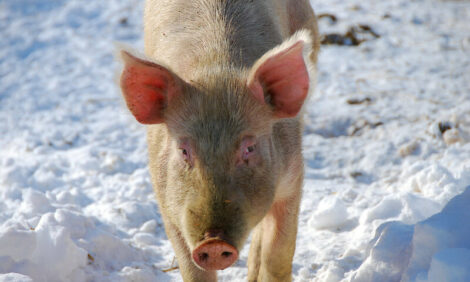FVO Raises Some Welfare Concerns after Audit
CZECH REPUBLIC - The Food and Veterinary Office (FVO) of the European Commission has remarked on a number of improvements in welfare monitoring in its latest audit report. Two-thirds of sows are already in group housing but insufficient manipulable material was provided and tail docking is still routine.
The FVO has published its Final Report of a specific welfare audit carried out in the Czech Republic between 1 and 10 June 2010 in order to evaluate the implementation of controls for animal welfare on farms and during transport.
This report describes the outcome of a Food and Veterinary Office (FVO) specific audit in the
Czech Republic, which took place from 1 to 10 June 2010, as part of the general audit of the
Czech Republic carried out under the provisions of Regulation (EC) No 882/2004 on official food
and feed controls of the European Parliament and of the Council of 29 April 2004.
The specific audit evaluated the implementation of national measures, aimed at the control of
animal welfare and how these are organised and carried out in accordance with relevant
provisions of Regulation (EC) No 882/2004, and the multi-annual national control plan (MANCP)
prepared by the Czech Republic. Specifically the evaluation included measures aimed at the
control of animal welfare on farms and during transport. Attention was paid to examining the
implementation of corrective actions undertaken in response to the recommendations made in the
report of previous FVO animal welfare missions to the Czech Republic.
The report concludes that the CCA has addressed all recommendations of the previous FVO
reports on animal welfare on farms and during transport, except two recommendations from the
2007 report and one from the 2005 report. The system for checks on animal welfare is well
documented and the prioritisation of checks has been formalised. Although the staff has received
updated instructions and generally adequate training to keep up to date with their competences,
some procedures need further improvement and time to be implemented. The internal audit
division of the CCA has carried out audits on animal welfare in most of the regions and
supervision carried out according to planned frequencies; however, the effectiveness of inspections
is not yet fully verified. Although sanctions were generally dissuasive for the cases seen, the
enforcement system does not easily allow the CA to apply some sanctions.
Eighty-five per cent of laying hens are still in unenriched cages and the CA and the laying hen sector have
insufficient plans to ensure the deadline of 1 January 2012 is met for phasing out this production system.
Regarding the pig sector, the willingness to implement EU legislation noted in previous mission is
continuing. Holdings visited generally met the requirements and as two-thirds already have group
housing systems, it should be feasible to respect the deadline of 1 January 2013 for group housing of
sows. However, the composition of the manipulable material was not equivalent to that indicated
in EU legislation and tail docking was carried out systematically.
There has been progress with the implementation of checks on transport but there were several
shortcomings. These were mainly regarding long-distance transport of unweaned calves. In
addition, although the CA verified that journeys times were realistic prior to transport, they did
not fully ensure that journey times were subsequently respected, as journey logs were not
systematically filled in and returned, and records from the satellite navigation system were not
checked.
The multi-annual national control plan (MANCP) has not yet updated the information for
prioritising operations in relation to animal welfare.
The report makes a number of recommendations to the Czech competent authorities, aimed at
rectifying the shortcomings identified and enhancing the implementing and control measures in
place.
Further Reading
 | - |
You can view the Czech comments on the FVO's draft report and suggestions report by clicking here.
|












